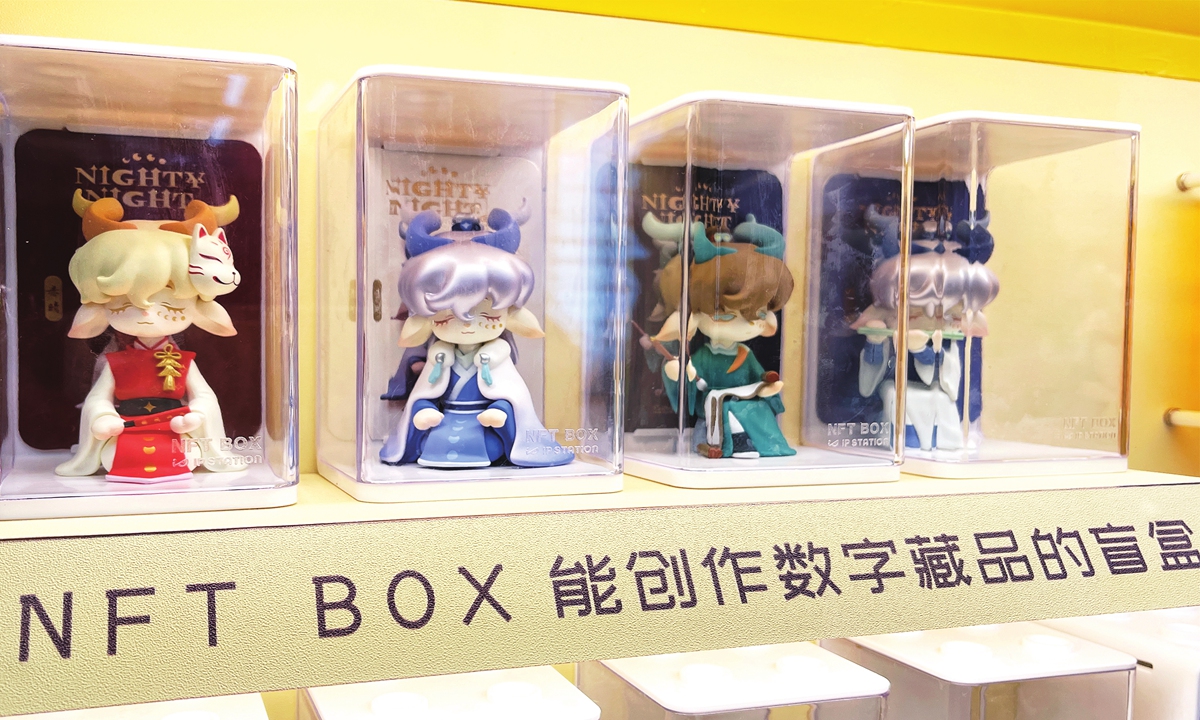Tightening regulation on NFT slows industry growth, but insiders expect more promising future with new application uses

A vending machine begins to sell “blind boxes” featuring a metaverse NFT digital collection on January 23,2022 at a mall in Beijing. Photo: VCG
The Chinese industry associations’ latest initiative targeting potential risks involving non-fungible tokens (NFTs) trading has revealed escalating disorder in a market that has been on a roller-coaster ride in recent years, aiming to build a sound foundation for the healthy development of the sector, industry insiders and analysts said on Sunday.
While the trading of cryptocurrencies and token offerings took a back seat amid a clampdown by global regulators over recent years, the digital asset industry regained momentum with the advent of NFTs.
As a digital asset developed based on blockchain, each NFT is a uniquely identifiable digital item that can be authenticated through blockchain, unlike most digital items which can be endlessly reproduced. According to a report from Nonfungible.com, trading in NFTs totaled $17.6 billion last year, an increase of 21,000 percent from 2020.
The industry has grown rapidly in China from last year, with domestic leading players such as Alibaba and Tencent betting big on the emerging sector. Tencent launched an NFT trading platform named Huanhe in August 2021, whereas Alipay launched 8,000 limited-edition NFTs based on two pieces of artwork to commemorate ancient artwork from the Dunhuang Caves in June which were sold out quickly after becoming available to the public.
Chinese celebrity Jay Chou’s jumping on the bandwagon of the latest craze further fanned enthusiasm in the industry, with some forecasting that more artists will enter the field and that the global market size may expand 10-fold this year.
However, some illegal financial activities connected with NFTs have drawn concerns, especially given that some institutions have conducted cryptocurrency trading or initial coin offerings disguised as NFTs, reflecting the urgency to tamp down on illegal behaviors.
Tightening regulation
The National Internet Finance Association of China, the China Banking Association and the Securities Association of China jointly issued an initiative on Wednesday, urging member firms to control financial activities involving NFTs, to process real-name identification for issuers, sellers and buyers, and to actively cooperate with the authorities in addressing anti-money laundering concerns.
In addition, the Metaverse Industry Committee under the China Mobile Communications Association on Thursday called for companies to resist unchecked speculation and guide reasonable expectations, as the development of digital collections is still at an early stage with unclear value standards.
Wang Peng, an assistant professor at the Gaoling School of Artificial Intelligence at the Renmin University of China, told the Global Times on Sunday that the initiative signals a continuance of Chinese regulators’ strict supervision over the fintech industry and focus on combating crypto trading.
Supervision in the sector may continue to be tightened, with compliance requirements on NFT trading platforms expected to become stricter, according to Wang. “But it’s not a one-size-fits-all approach. The key is to distinguish NFTs that have genuine value from those linked with crypto trading or speculation. In other words, regulators will properly guide legal moves while stifling illegal transactions,” he said.
It’s worth noting that some platforms have been stepping up efforts to clampdown on NFT speculation. In March, Tencent’s WeChat platform blocked more than 10 public accounts involved in NFT trading, with most being small- and medium-sized NFT exchanges, while Ant Group-backed NFT trading platform ”Jingtan” removed more than 180 accounts for violating regulations, according to media reports.
However, NFT pieces that are of real function or collecting value still have great potential in the future by enriching the digital economic model and promoting the development of the cultural and creative industry, according to industry insiders.
Value to be explored
The NFT industry in China is still at a preliminary stage, with their applications in a variety of scenarios yet to be fully explored, for example, game tools, account management, bulk commodities and intellectual property, Cao Yin, managing director of the Shanghai-based Digital Renaissance Foundation, told the Global Times on Sunday.
Cao said that bubbles may exist in NFT collections in the domestic market, reminding common investors to be cautious over the risks of blind speculation. “Domestic players should debut NFTs on international public networks like Ethereum to promote more convenient trading,” he said.
Most of the NFT trading in China is executed using legal tender such as yuan, while foreign exchanges support payments in multiple forms in addition to legal tender, such as crypto currency like Bitcoin, Ethereum and USTD.
China’s state-backed Blockchain Services Network announced in January the launch of a neutral and reliable infrastructure network, named BSN-Distributed Digital Certificate (DDC), which will offer application programming interfaces for platforms to manage NFTs at a low cost. Domestic internet giants including Alibaba, Tencent and Baidu have rolled out digital collections based on the technology and it’s expected that more companies and institutions will embrace the DDC industry.
Given its small market size at present, Chinese brokerage firm Guosen Securities noted in a research report in April that the country’s NFT market would be valued at 29.8 billion yuan ($4.68 billion) as of 2026 if regulators permitted reselling.